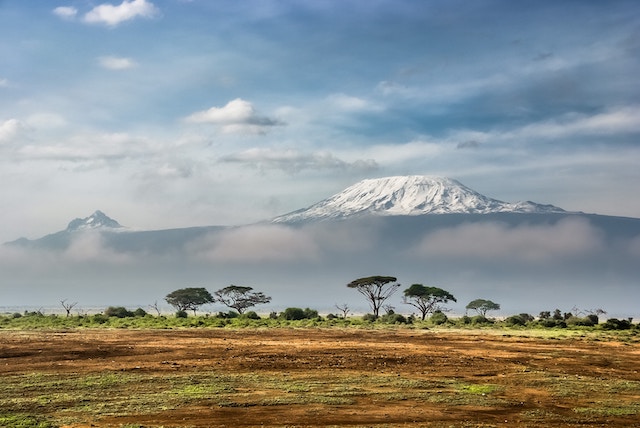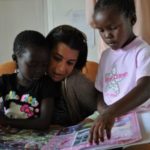Not a Sh*thole Country: A True Welcome in Kenya

Above my front door hangs a wooden sign carved with the word ‘Karibu’, the Swahili word for ‘welcome’. I heard the word repeatedly in Kenya, and experienced its true meaning. I brought that sign home as a reminder of the hospitality and generosity of spirit that I encountered there.
In 2010, I traveled to Kenya on a service and educational trip sponsored by the University of Denver, and our social work group allied with the African Network for Animal Welfare. Their organization reduces human-animal conflict by helping communities identify profitable alternatives to poaching.
They also work with the Kenya Wildlife Service to locate and remove poaching snares. Their work spares animals from painful death, and provides artisans with wire to create art that is sold to tourists.
In all my travels, I have never experienced welcomes like those I received in Kenya. ‘Karibu’ was so much more than a figure of speech.
I felt compelled to write about my experience in Kenya after hearing the racist, hateful words from the man occupying the White House. His disparaging remarks revealed a failure to grasp the critical role that immigration, diversity, empathy, and inclusivity have in the USA. He is allowing bigotry to influence immigration policy.
During my trip, I had the opportunity to interact with many Kenyans in their homes, schools, and communities. My journey took me from the urban center of Nairobi, to the vast wilderness of Tsavo National Park, to the beaches of Mombasa. The wild and gracious spirit of Kenya touched my heart, and captivated my imagination.
In all my travels, I have never experienced welcomes like those I received in Kenya. ‘Karibu’ was so much more than a figure of speech.
I will never forget stepping off the bus at the Waatha Cultural Center, just outside Voi. We traveled there to stay in their campground, help with various chores, and learn from one another. When we arrived, a crowd of women wearing brightly colored lesos took our hands and drew us into a circle of joyous song and animated dance. No-one had ever greeted me with such warmth and enthusiasm. When I close my eyes and think of this moment, I can’t help but smile.
Those young women demonstrated the values and work ethic that government leaders should respect and embrace.
I recall another welcome in a very different environment. We visited the Kibera Girl’s Soccer Academy in a highly populous urban slum on the outskirts of Nairobi. The school provided girls with an otherwise unaffordable high school education, and further empowered them through the game of soccer.
We broke into small groups and the students took us on tours of their homes and surrounding community. I had never witnessed poverty on that level, and I fought back tears as I saw the conditions that our sixteen year old guide navigated so proficiently. Her father had left to find work to support their family, while she continued her education and cared for their home.
The couple next door was concerned for her safety, and spent each night in her home so she wouldn’t be alone. She was Christian and the couple were Muslim, but she said they did not let religion get in the way of caring for one another. I felt honored to be welcomed into her home, and gratitude for being trusted with her story. A better example of love, tolerance, and perseverance would be hard to find anywhere.
Back at the school, some of the students described the challenges and rewards of committing to their education. The principal noted that it was sometimes difficult for students to learn when they were hungry. But, all the girls were excited by the prospect of a university education.
They knew it would allow them to help their families and community. Those young women, born into unimaginable poverty perpetuated by systemic inequality, exhibited the true meaning of resilience, determination, and self empowerment. They demonstrated the values and work ethic that government leaders should respect and embrace.
Young women pursued education to transcend poverty and lift up their community. I remember wonderful people that I would be proud and honored to welcome into my country.
Other encounters brought similar warm welcomes. The women of the Rotunga Basket Weaving Guild greeted us with more song and dance, and graciously provided a lesson in the intricate art of weaving. My instructor and I laughed till we cried, as I bungled the weaving steps she so easily mastered. Somehow, her warmth transcended my ineptitude, and instead of embarrassment, I felt a deep connection.
Wildlife conservationists welcomed us and taught us about the links between human displacement and poaching. They worked tirelessly to save the lives of wild animals and help the communities who lived in their midst. A local artisan transformed a former poaching snare into a work of art that would profit the people in his village.
We brought a small tree to plant with our elderly Waatha host, and she dressed in her finest leso to honor our gift. At another home, we came prepared to work in the field, and our hosts insisted we first have some chai. With little to spare, they shared with us anyway. After helping with house building, an entire community came together to share a giant pot of ugali.
I remember children smiling and waving wherever we went. I remember empathy and compassion for animals. People moved through their daily lives, adeptly negotiating challenges. Young women pursued education to transcend poverty and lift up their community. I remember wonderful people that I would be proud and honored to welcome into my country.
The meaning of ‘welcome’ in the USA has been defiled by our current government, but in Kenya, ‘Karibu’ holds real meaning.
In Kenya, I had many amazing and transformative experiences. I walked through the bush looking for poaching snares while giraffes loped past. I bottle-fed orphaned baby elephants, watched them play in the mud, and marveled at giant tuskers roaming through Tsavo. Yet, the memories that made the most lasting impression were of the kindness, generosity, resilience, hard work, determination, and the laughter of the people I met.
The current administration spewed racist insults from our nation’s highest office, soiling the reputation of my country, the immigrants who built it, and those who dream of living here. In the United States, unless we are Native American, we are all of immigrant descent from some “sh*thole country”. Our strength has always been diversity and willingness to be a social “melting pot”.
Most Americans are appalled at the racist language and xenophobic policies coming out of the White House. The administration demeaned entire cultures embodying values that actually did make America great. In a further sign of disrespect and cruelty, the man in the White House endorsed trophy hunting of endangered African species. He disregarded conservation experts and decades of work from African organizations to save those species.
Not a Sh*thole Country: A True Welcome in Kenya
I urge Americans to contact their Senators and demand action to hold the White House accountable for its racist statements. It is incumbent upon us to take action to restore our democratic principles and global reputation. In the United States, racism is prohibited from informing policy.
The meaning of ‘welcome’ in the USA has been defiled by our current government, but in Kenya, ‘Karibu’ holds real meaning. My greatest hope is that we can somehow manifest the grace of the Kenyan people, and once again, put out the welcome mat in America.
Photo credit for Not a Sh*thole Country: A True Welcome in Kenya by Unsplash.com.









I am really looking forward to visiting Kenya one of these days. I enjoyed reading this article, thanks for sharing your experience.